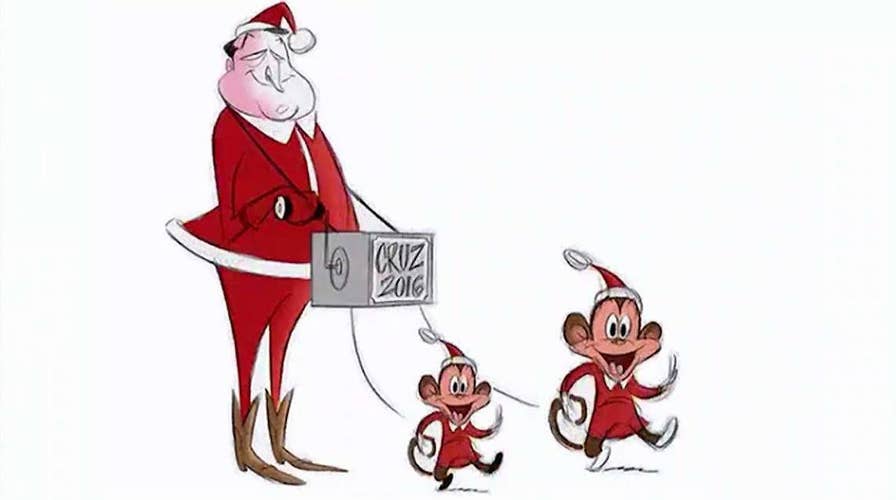How far is too far in political commentary?
On 'Special Report,' Howard Kurtz examines the controversy over a WaPo editorial cartoon about Ted Cruz and his family
In daily journalism, there are inevitably mistakes, misjudgments and missteps.
And then there is portraying a politician’s children as animals.
Why the Washington Post thought such a cartoon about Ted Cruz was fit to print is beyond me. I’m equally puzzled by the media’s muted reaction.
I grant cartoonists plenty of leeway, but this isn’t some gray area. This is way, way, way over the line. Caroline Cruz is 7 years old and Catherine Cruz is 4.
Now it’s true that the Texas senator has sent out a fundraising letter based on the cartoon. This is how one Post columnist handled it:
“Media-bashing Republican presidential candidate Ted Cruz was handed a political gift Tuesday night when The Washington Post retracted an editorial cartoon that depicted his two young daughters as monkeys.”
A gift, right.
“Yes, we’re raising money on this, but not nearly enough to cover the damage,” Cruz adviser Rick Tyler told me. He said a number of reporters, including some at the Post, have emailed him to say how embarrassed they are.
The senator himself had the right message at an event yesterday:
“Don’t mess with my kids, don’t mess with Marco’s kids, don’t mess with Hillary’s kid, don’t mess with anybody’s kids. Leave kids alone.”
The cartoonist in question is Ann Telnaes, who won a Pulitzer Prize back in 2001. I think it’s fair to say she’s not a fan of Cruz, or Donald Trump, or Republicans generally. In an earlier sketch, she called Cruz a warmonger and depicted him beating a drum, naked, as bombs rained down from the sky.
The new cartoon was prompted by a satiric video in which Cruz and his family pretended to read from Christmas classics. His 7-year-old daughter read a line poking fun at Hillary Clinton’s email mess.
It was cute, if a little unorthodox. All politicians showcase their kids at rallies, conventions and in ads.
But Telnaes was offended. As she wrote in a post accompanying the cartoon,
"There is an unspoken rule in editorial cartooning that a politician’s children are off-limits.” But “when a politician uses his children as political props, as Ted Cruz recently did in his Christmas parody video in which his eldest daughter read (with her father's dramatic flourish) a passage of an edited Christmas classic, then I figure they are fair game."
So she depicted Cruz as an organ grinder and his girls as trained monkeys.
Fred Hiatt, the Post’s editorial page editor, took the cartoon down. In a statement, he said: “It’s generally been the policy of our editorial section to leave children out of it. I failed to look at this cartoon before it was published. I understand why Ann thought an exception to the policy was warranted in this case, but I do not agree.”
No editor can be expected to see everything in this age when content is constantly being fed online. But what was absent was any kind of apology to Cruz and his family. Telnaes isn’t in an apologetic mood, tweeting: "Ted Cruz has put his children in a political ad -- don't start screaming when editorial cartoonists draw them as well."
The paper has no plans to apologize.
I don’t have to tell you how great the media explosion would have been had the target been President Obama’s girls. It became a huge story last year when Elizabeth Lauten, a congressman’s communications director, ripped Sasha and Malia for their attire and attitude at the annual Thanksgiving turkey pardon, saying they should show “a little class.” She apologized, but lost her job.
People magazine was widely lambasted for a 1999 cover story on Chelsea Clinton during the Monica Lewinsky uproar, published despite a personal appeal from Bill and Hillary Clinton.
Political offspring should be off-limits, period, unless they make a speech or run into trouble with the law. The Cruz daughters didn’t exactly choose to put themselves out there. His GOP rivals, including Donald Trump, Marco Rubio and Jeb Bush, ripped the newspaper on Cruz’s behalf.
In his $1-million fundraising pitch, Cruz said the “liberal media” are trying to “destroy” him and his family.
Unfortunately, a single cartoon has given fresh ammunition to those who believe that is true.












































